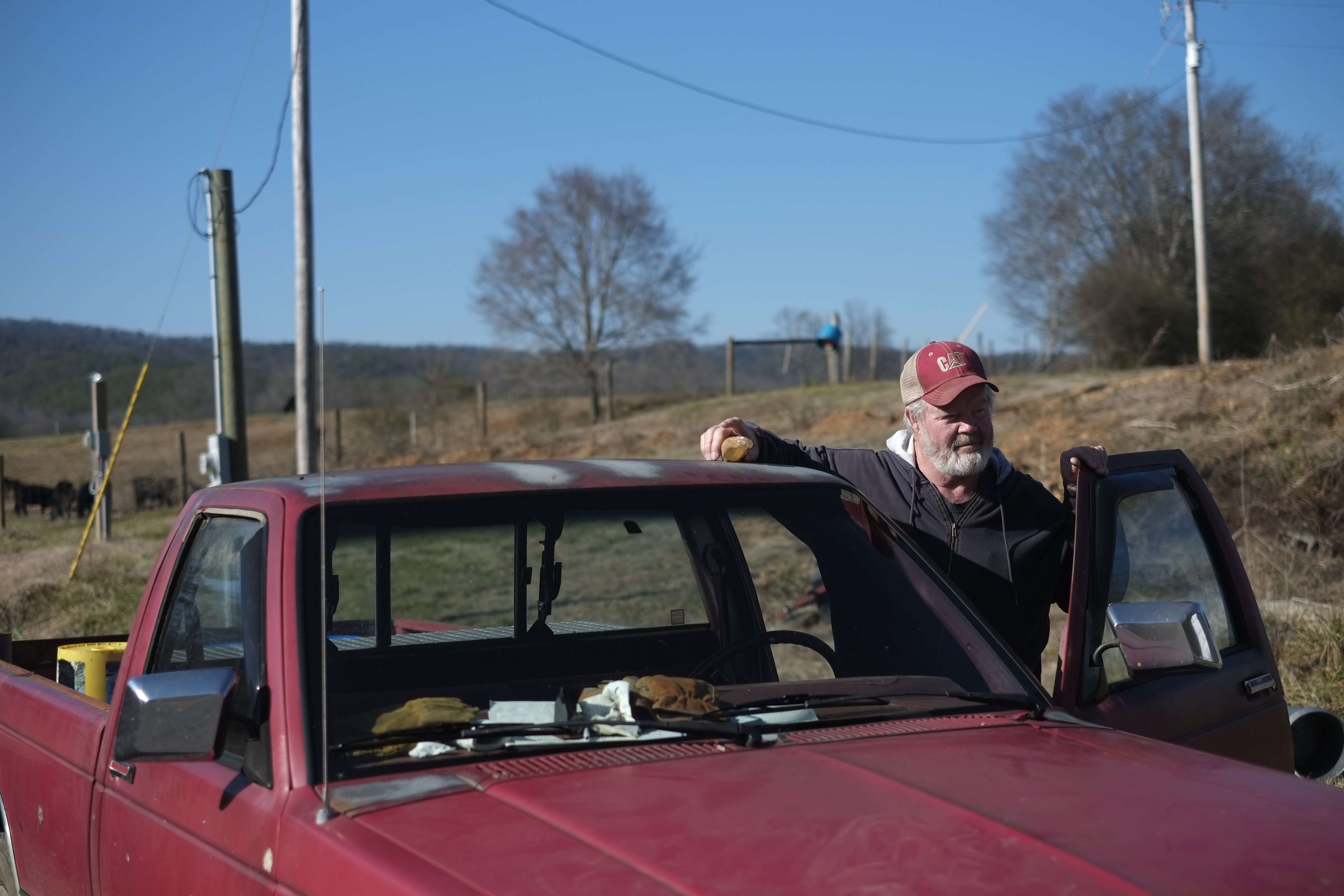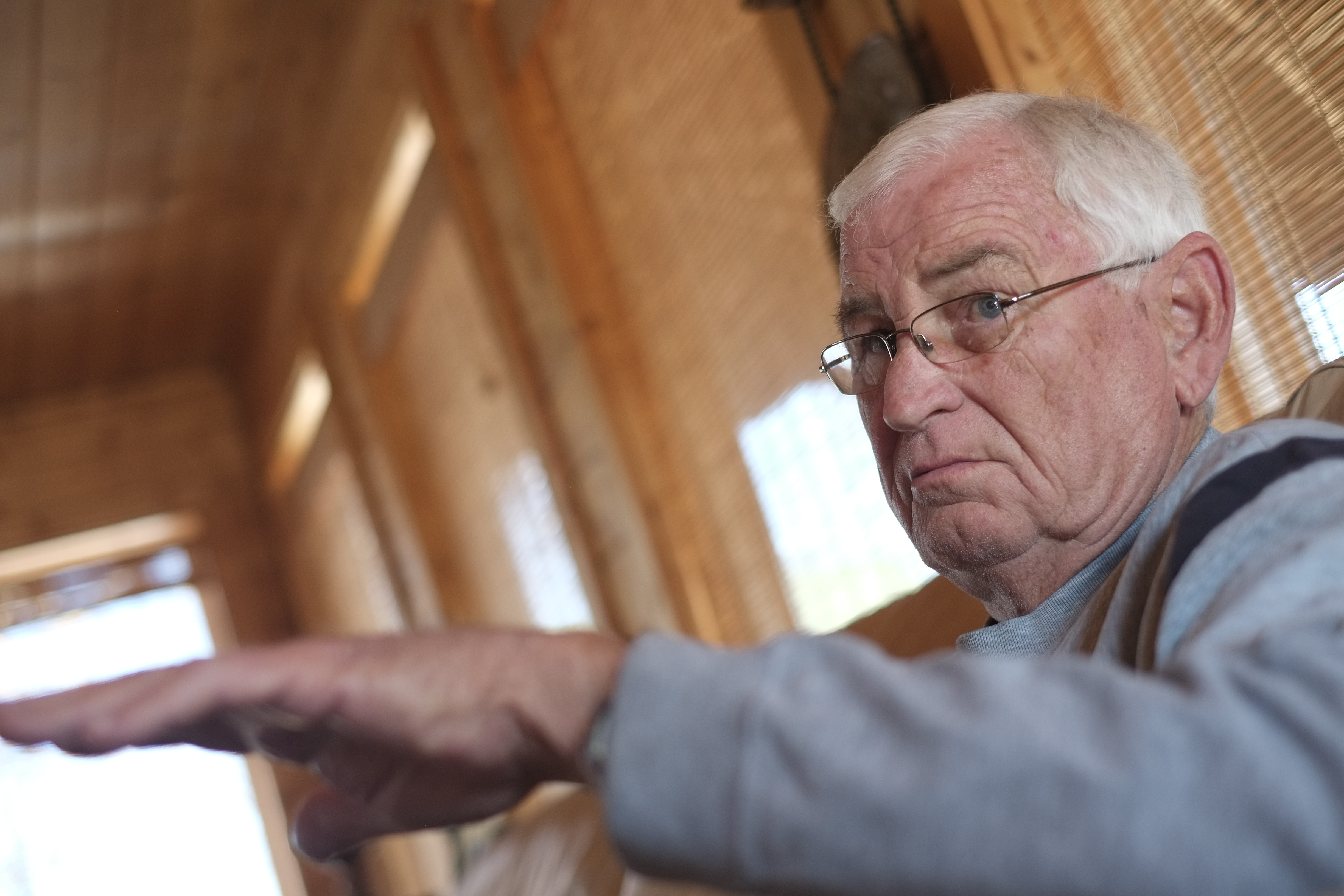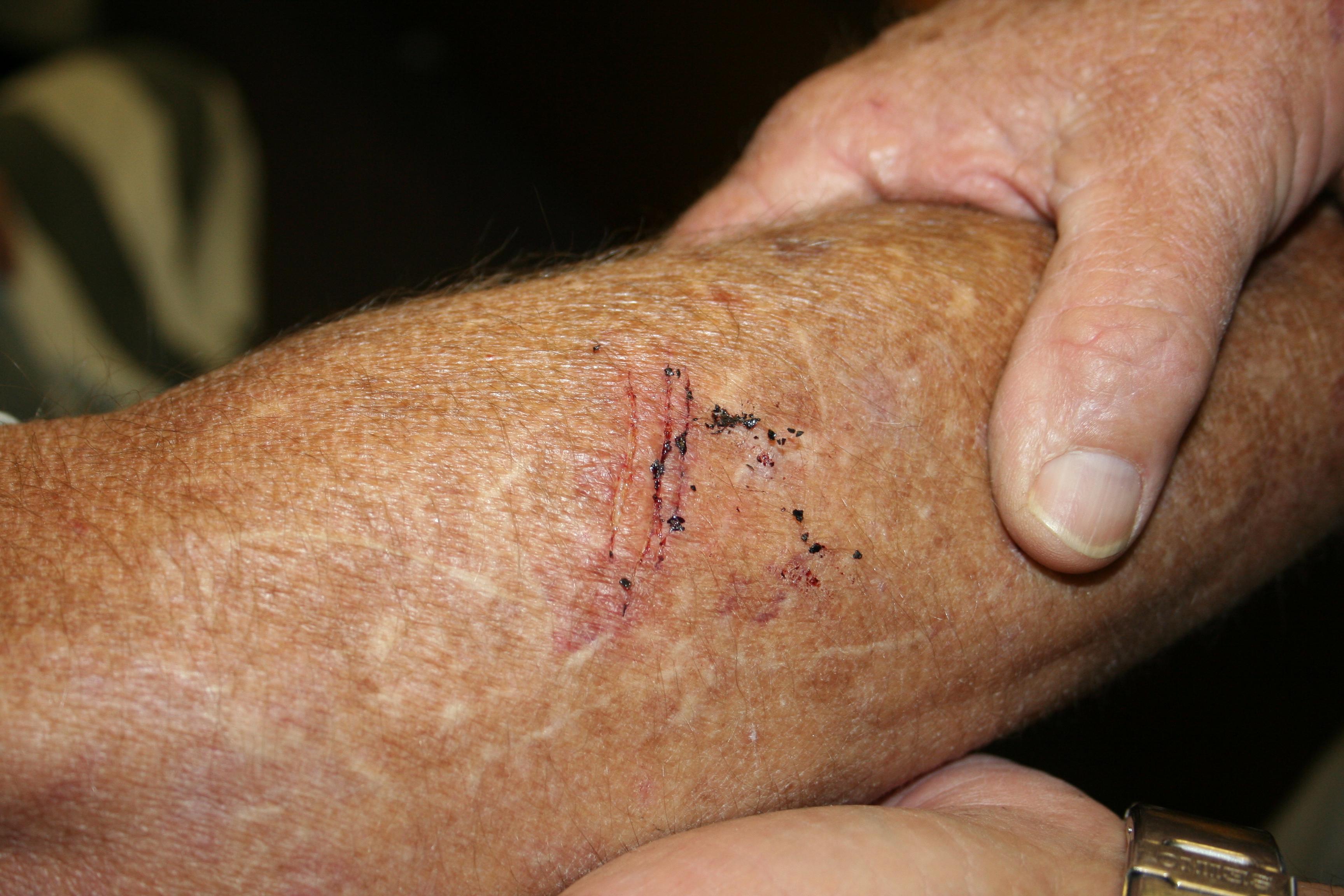 Michael Kirby talks in his home in Rome, Ga., on Tuesday, Feb. 10, 2015, about the 2010 killing of his brother, James "Pee Wee" Kirby, who was fatally shot by Bob Packer on Packer's farm in Summerville, Ga. Packer was acquitted of the crime after two trials and later shot and killed on the same farm in 2014, allegedly by his girlfriend Deborah Wilkins.
Michael Kirby talks in his home in Rome, Ga., on Tuesday, Feb. 10, 2015, about the 2010 killing of his brother, James "Pee Wee" Kirby, who was fatally shot by Bob Packer on Packer's farm in Summerville, Ga. Packer was acquitted of the crime after two trials and later shot and killed on the same farm in 2014, allegedly by his girlfriend Deborah Wilkins.SUMMERVILLE, Ga. -- Michael Todd Kirby held a grudge against a ghost.
He hated William Robert Packer, his brother's killer. He wanted him to suffer the way the Kirbys suffered; to sit in a prison cell for the rest of his life. But Kirby watched as two juries acquitted him of murder.
He didn't blame the prosecution. Kirby, who is black, blamed the sheriff's office, who he believes intentionally collected little evidence in order to protect Packer, a white man from a prominent Chattooga County family.
Instead of providing closure, the courtroom made him feel helpless, disenfranchised. Packer had shot 48-year-old James "Pee Wee" Kirby in October 2010 with impunity. Sometimes, for a moment, the victim's little brother considered revenge.
"Y'all better do something," he told the sheriff's office over the phone one day, "before I kill him."
Kirby didn't know how to treat his pain. The pastor told him to forgive Packer, but he refused. He had to hate. Hate felt natural.
 Perry Westbrook talks Tuesday, Feb. 10, 2015, on his Summerville, Ga., farm about James "Pee Wee" Kirby, who he sometimes hired to do odd jobs around his property. Kirby was shot and killed in 2010 by Bob Packer on Packer's farm. Packer was acquitted of the crime after two trials and later shot and killed on the same farm in 2014, allegedly by his girlfriend Deborah Wilkins.
Perry Westbrook talks Tuesday, Feb. 10, 2015, on his Summerville, Ga., farm about James "Pee Wee" Kirby, who he sometimes hired to do odd jobs around his property. Kirby was shot and killed in 2010 by Bob Packer on Packer's farm. Packer was acquitted of the crime after two trials and later shot and killed on the same farm in 2014, allegedly by his girlfriend Deborah Wilkins.Then, last June, the 63-year-old Packer was killed in his own home. Deputies said his girlfriend, Deborah Elaine Wilkins, shot him three times in the back with a Colt .45.
Wilkins' trial begins Monday, when prosecutors will provide more details about what led to the killing.
Michael Kirby said Packer's death was the result of Old West, cowboy justice. When the police can't punish a killer, he said, it's up to others. He plans to follow Wilkins' trial this week.
He hopes she is acquitted.
Two families
For at least 100 years, neighbors say, the Kirbys and the Packers have lived down the road from each other in the Gore community, a farming network off the eastern edge of Taylor's Ridge.
The Packers were linchpins in the area. They owned hundreds of acres of land and operated a dairy farm. Bob Packer's father, William Clyde Packer, ran the first shoe store in Chattooga County.
Fifty years later, a local road is still named after them. When Packer's father died in 2007, prominent Summerville attorney Bobby Lee Cook gave the eulogy.
The Kirbys, meanwhile, have lived in small houses across the road. Jim Hunter, 88, a furniture store owner in the area, said the Kirbys were tenant farmers for generations.
As teenagers, Pee Wee and Michael Kirby earned reputations as steady farmhands. They built fences, moved hay and operated heavy machinery for their neighbors, including Bob Packer.
Pee Wee Kirby maintained a garden for him and cut his drywood. The two became hunting buddies, and Pee Wee began spending his free time at Packer's home at 2646 John Jones Road.
Both men ran into trouble with the law. In 1994, police records show, Packer shot a man in the leg outside a Mexican restaurant, and Kirby went to prison for a year in 1999 on a theft conviction.
Around 2005, Packer had a neck injury that forced him to take pain medications, and neighbors and friends say he became an alcoholic and cocaine addict.
His ex-wife, daughter and sister declined to comment for this article. But Wilkins told police that Packer slept with a gun under his pillow.
In May 2007, he fired shots into the floor near his wife's feet. After they divorced, he threatened to kill Wilkins, his new girlfriend. He pressed a gun to her head in the middle of the night, police records show, then berated her for eating his food, drinking his Coca-Colas and supposedly sleeping with other men.
"We made up after that," Wilkins said during a police interview. "He apologized."
Soon after, though, Packer ran out of money. In 2008, he had to borrow $48,000 from Suntrust Mortgage. Two years later, court records show, he sold his 81-acre property, though he continued to live at the house until he died.
On Oct. 5, 2010, Packer and Pee Wee Kirby drove to the home of Joe Dawson, a local farmer. Dawson later told police that Kirby came inside while Packer waited in the car. He said Kirby told him that Packer needed to borrow $100. Dawson gave him the money.
The next day, Dawson went to Packer's house to get the payment back. Packer said he didn't know anything about $100. Dawson called Kirby and handed the phone to Packer.
Dawson left, and Kirby walked to Packer's house.
A botched investigation
Against tan, weathered skin, three lines appeared slight, shallow. A few centimeters long each, the cuts were perfectly parallel, one on top of another, just below Packer's elbow.
About an hour earlier, from his doorway, Packer had fired a shotgun at Pee Wee Kirby's chest. He said he accused Kirby over the phone of stealing money, and Kirby showed up at his house, wild-eyed and wielding a pocketknife.
He said Kirby cut him three times before he grabbed his gun to save himself.
Chief Investigator Larry Kellett didn't believe the story. For one thing, Packer drunkenly slurred his words. And the small cuts didn't make sense.
People don't attack you with a knife by sliding it against your arm three times, Kellett said. They stab you.
Several people who knew Kirby doubted he brought a weapon to Packer's home. Michael Kirby said his brother never owned a knife. Dawson and Perry Westbrook, another local farmer, told the sheriff's office that they lent Pee Wee Kirby tools whenever he needed to cut something in their fields.
Kellett thought Packer shot Kirby in a rage, then cut himself to stage a claim of self-defense.
Kellett had already decided to leave the department at the end of the month because of a personality conflict with Sheriff John Everett, so he assigned the case to Detective Kandy Dodd.
"It looked like it was going to be a pretty easy case," Kellett said.
So what happened?
"Well, it was just a big evidence screw-up."
Except for the shotgun, prosecutors could not present anything they found in Packer's house to a jury because investigators searched the property without a warrant. This eliminated several open bottles of alcohol found in the living room. The investigative report also shows no sign of a toxicology report for Packer, though detectives did run one on Kirby. The test showed cocaine and hydrocodone in his system.
Multiple law enforcement officials with knowledge of the case, speaking on the condition of anonymity, said a member of the department washed Packer's clothes instead of storing them with the rest of the evidence. This meant experts could not perform a blood spatter test, which would have indicated how far Packer stood from Kirby when he shot him. That knowledge could have helped support or disprove Packer's self-defense claim.
According to the investigative file, the sheriff's office lost a DNA swab from the knife before the trial. Dodd said last week she did not remember that the swab went missing, but the news did not surprise her.
 Retired Chattooga County Sheriff's Department chief investigator Larry Kellett talks in his home Tuesday, Feb. 10, 2015, about the investigation of the 2010 killing of James "Pee Wee" Kirby by Bob Packer on Packer's Farm in Summerville, Ga. Packer was later shot and killed on the same farm in 2014, allegedly by his girlfriend Deborah Wilkins.
Retired Chattooga County Sheriff's Department chief investigator Larry Kellett talks in his home Tuesday, Feb. 10, 2015, about the investigation of the 2010 killing of James "Pee Wee" Kirby by Bob Packer on Packer's Farm in Summerville, Ga. Packer was later shot and killed on the same farm in 2014, allegedly by his girlfriend Deborah Wilkins.Important material frequently disappeared when Everett was sheriff.
"The evidence room just was not organized," she said.
But even before committing any of those errors, the sheriff's office contaminated the crime scene.
When Cpl. Kenneth Craig and Deputy Andrew Plummer arrived at Packer's house, they performed CPR on Kirby even though Kellett said he could immediately see Kirby was dead.
The deputies found him lying face-down near the front door, palms up, the pocketknife sitting in his right hand. Instead of taking a picture of the scene, Craig kicked the knife away. A jury could never see how Kirby held the weapon or determine whether he would have actually held onto it after getting shot.
Craig declined to comment for this article, but Plummer said he doesn't blame his partner. Adrenaline was running, and they were entering a home with a history of violence.
"I think it was his instincts from watching cop shows and what not," he said. "You just take the weapon away from the victim."
Residue of anger
Kellett and most of the other members of the investigation are no longer working in law enforcement. Plummer was fired after a defendant said Plummer choked him. Dodd left after residents sued her for searching a home without a warrant.
Everett, who could not be reached for comment, lost his 2012 election to Mark Schrader.
Michael Kirby was angry at all of them.
"If they had cared about my brother, they would have done something about it," he said. "They would have done some investigation. ... They didn't care nothing about the black people. It's all about Chattooga County and the white people."
Kirby is interested in another element of the case: Packer's phone records. After the shooting, according to the investigative file, Packer had four phone conversations before calling 911.
Minutes after shooting Pee Wee Kirby, Packer called Dawson's wife at 2:50 p.m. to tell her what he did. He dialed Dawson's number again at 3:20 p.m. and asked her to call 911. She told him to do it himself.
Packer called the police five minutes later.
But in between calling the Dawsons and before calling the police, phone records show, Packer talked with a friend named Eric Reynolds, Deborah Wilkins' brother.
Reynolds told police that Packer reported the same story to him that he would later tell Kellett.
"You can't go to a man's house and pull a knife and cut him and not expect something to happen," Reynolds said during a police interview. "There ain't no way."
However, a source with firsthand knowledge of Reynolds' phone conversation and a second, independent source who heard a recounted version of the conversation both say the phone conversation with Packer didn't unfold that way.
Investigators did not meet with either source after Kirby's death but, speaking on the condition of anonymity, both said Reynolds repeated one question to Packer that afternoon.
"He cut you, didn't he?"
"He cut you, didn't he?"
"He cut you, didn't he?"
When a reporter called Reynolds last week, he declined to comment. He said the Kirby investigation is nobody's business.
Four years later
Last summer, Michael Kirby's uncle told him that a string of police cars were sitting on Packer's property, again. This time, Packer was the victim.
Kirby had moved out of town in an effort to forget that Packer had never been held to account for his brother's death. He felt Packer's grip on him loosening, slowly. He stopped imagining Packer inflicting violence.
He still felt pain, still cried for his brother at least once a week. He didn't feel anger toward Packer, though. He realized there was no use, no grudge that could fuel anything positive in his life. This is forgiveness, he supposed.
He's not moving back to Chattooga County, though. Watching Packer's trial peeled away a scab, revealed a wound running much deeper than he expected.
Even if they weren't intentional, he said, the deputies' errors told him that a Kirby's life isn't as important as that of another person's. Somehow, with time, the investigation stings worse than the actual killing.
And that, he can't forgive.
Contact staff writer Tyler Jett at tjett@timesfreepress.com or 423-757-6476.
From the future, March 4, 2015:

